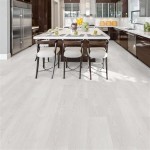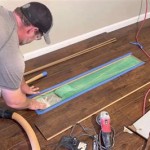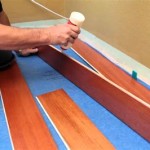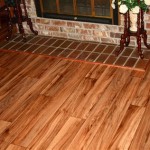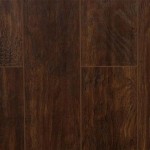Vinyl Wood Plank Flooring Thickness: Essential Considerations for Your Flooring Projects
When choosing vinyl wood plank flooring, thickness is a crucial factor to consider as it directly affects the durability, performance, and overall feel of your flooring. Understanding the different thickness options and their implications will help you make an informed decision for your specific needs.
Standard Vinyl Plank Thicknesses
Vinyl wood plank flooring generally falls within the following thickness ranges:
- 2mm to 3mm: These thinner planks are ideal for low-traffic areas and temporary installations.
- 4mm to 5mm: While still relatively thin, these planks offer increased durability and are suitable for moderate traffic areas.
- 6mm and above: These thicker planks provide excellent stability, noise reduction, and indentation resistance, making them ideal for high-traffic and commercial applications.
Impact of Thickness on Durability
Thickness plays a significant role in the durability of vinyl wood plank flooring. Thinner planks are more susceptible to punctures, tears, and indentations from furniture and foot traffic. Conversely, thicker planks provide greater stability and resistance to wear and tear, making them ideal for areas with heavy footfall or potential impacts.
Noise Reduction and Insulation
Thicker vinyl wood planks offer superior noise reduction compared to thinner planks. The added thickness acts as a sound barrier, absorbing footsteps and other noise from penetrating the subfloor. This makes thicker planks an excellent choice for areas where noise reduction is a priority, such as bedrooms, offices, and media rooms.
Comfort and Feel
Thicker vinyl wood planks provide a more comfortable and cushioned underfoot compared to thinner planks. The added thickness absorbs impact, reducing fatigue and creating a more comfortable walking experience, especially when standing for extended periods.
Considerations for Installation
The thickness of vinyl wood planks can also affect installation. Thinner planks are generally easier to cut and install, while thicker planks may require specialized tools and techniques. It is essential to consult with a flooring professional to ensure the proper installation of the chosen thickness.
Matching the Right Thickness to Your Needs
Ultimately, the ideal thickness for your vinyl wood plank flooring depends on your specific requirements and intended use. Consider the following factors:
- Foot traffic: Choose thicker planks for high-traffic areas to ensure durability.
- Noise level: Opt for thicker planks for noise reduction in areas where tranquility is desired.
- Comfort: Thicker planks provide a more comfortable walking experience for extended periods.
- Installation: Consider the ease of installation based on the thickness of the planks.
By understanding the essential aspects of vinyl wood plank flooring thickness, you can make an informed decision that will enhance the durability, performance, and overall appeal of your flooring project.

Choose The Suitable Spc Flooring Vinyl Floor Lvt For You

How Thick Is Vinyl Plank Flooring Thickness Guide Reallyfloors America S Est Hardwood

How To Choose Perfect Thickness Of Vinyl Plank Flooring

Luxury Vinyl Flooring Lvt And Lvp Thickness Guide Wood Beyond Blog

Which Thickness Is Best For Your New Luxury Vinyl Plank Flooring

Vinyl Plank Vs Laminate Flooring Which Is Right For You Onflooring
What Is A Good Thickness For Vinyl Flooring Quora

Diffe Thicknesses Of Vinyl Plank Flooring Why They Matter

3 Ways To Choose Vinyl Plank Flooring Wikihow

3 Ways To Choose Vinyl Plank Flooring Wikihow
Related Posts



